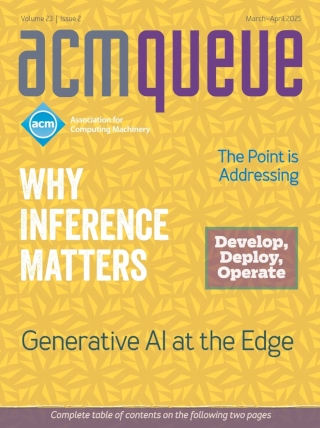Recent News
AI Is Wearing Down Democracy
The New York Times
Switzerland's International Panel on the Information Environment found AI was used in more than 80% of elections in 2024. The study showed 25% of cases involved candidates using AI for translating speeches and platforms, identifying groups of voters for outreach, and other campaign-related tasks. However, AI was found to have played a harmful role in 69% of cases.
From "AI Is Wearing Down Democracy"
The New York Times (06/26/25) Steven Lee Myers; Stuart A. Thompson
View Full Article - May Require Paid Subscription
Cyberattack on U.K. Health Firm Contributed to Patient Death
Bloomberg
A June 2024 cyberattack affecting Synnovis, which provides blood testing, transfusion, and other pathology services to the U.K. National Health Service (NHS), was confirmed to have contributed to a patient's death. The King's College Hospital NHS Foundation Trust in London said that a long wait for a blood test as a result of the cyberattack was a contributing factor in the patient's death. The attack, perpetrated by a hacking gang linked to Russia, resulted in more than 10,000 postponed appointments and more than 1,700 canceled elective procedures, the NHS said.
From "Cyberattack on U.K. Health Firm Contributed to Patient Death"
Bloomberg (06/25/25) Ryan Gallagher
View Full Article - May Require Paid Subscription
U.S. Lawmakers Urge Action on Cybersecurity in Face of Quantum Threat
Quantum Insider
During a June 25 hearing of the U.S. House Subcommittee on Cybersecurity, Information Technology, and Government Innovation, federal officials called for the urgent modernization of cybersecurity infrastructure to prepare for the possibility that quantum computing could one day crack cryptographic protocols. U.S. Government Accountability Office's Marisol Cruz Cain emphasized the importance of government investments to develop a skilled workforce, fund basic research, and formulate long-term strategies to protect against quantum-enabled attacks. IBM's Scott Crowder said full adoption of post-quantum cryptographic standards by industries and the government could take more than 10 years.
From "U.S. Lawmakers Urge Action on Cybersecurity in Face of Quantum Threat"
Quantum Insider (06/26/25) Matt Swayne
View Full Article
North American Airlines Targeted by Cyberattacks
NBC News
WestJet and Hawaiian airlines said they were responding to cyberattacks, while American Airlines experienced a technical issue on Friday, although it’s unclear if it was related or caused in any way by hackers. Google and Palo Alto Networks said Friday they observed a cybercriminal group nicknamed Scattered Spider that tries to hack companies involved in aviation. The FBI posted a warning Friday evening that Scattered Spider was targeting the aviation industry.
From "North American Airlines Targeted by Cyberattacks"
NBC News (06/27/25) Kevin Collier
View Full Article
Robotic Arm 'Feels' Using Sound
IEEE Spectrum
A sensing system developed by Carnegie Mellon University researchers allows autonomous robots to use sound to sense the objects they touch. The SonicBoom system conducts haptic mapping via sounds waves through microphones embedded in a robotic arm. An AI model trained on data collected by tapping the robotic arm more than 18,000 times with a wooden rod allows the system to localize contact with an error rate of just 0.43 centimeters for objects it was trained to detect.
From "Robotic Arm 'Feels' Using Sound"
IEEE Spectrum (06/28/25) Michelle Hampson
View Full Article
PNG Updated for First Time in 22 Years
Tom's Hardware The World Wide Web Consortium last week released an update to the Portable Network Graphics (PNG) image format for the first time in 22 years. The update introduced three new features, including support for High Dynamic Range images, animation through Animated PNGs, and Exif data storage.
The World Wide Web Consortium last week released an update to the Portable Network Graphics (PNG) image format for the first time in 22 years. The update introduced three new features, including support for High Dynamic Range images, animation through Animated PNGs, and Exif data storage.
From "PNG Updated for First Time in 22 Years"
Tom's Hardware (06/27/25) Jowi Morales
View Full Article
Finding Viable Sperm in Infertile Men Can Take Days. AI Did It in Hours
The Washington Post
Columbia University Fertility Center researchers used AI to help a couple struggling with infertility for 18 years to conceive. The researchers used AI to scan a semen sample and located 44 viable sperm within an hour, after labs ran the same sample and found nothing over a two-day period. The sample, placed on a single-use microfluidic chip, was illuminated and imaged by a microscope connected to a high-speed camera that captures millions of images, which are analyzed in real time using AI.
From "Finding Viable Sperm in Infertile Men Can Take Days. AI Did It in Hours"
The Washington Post (06/27/25) Sabrina Malhi
View Full Article - May Require Paid Subscription
Smart Tractors Vulnerable to Takeover
Dark Reading
Researchers at Austria- and Germany-based Limes Security came up with a method to simultaneously spy on tens of thousands of smart tractors around the world and take full control over any of them. The method relies on vulnerabilities in FJD AT2, an aftermarket steering system developed by Chinese manufacturer FJDynamics. According to Limes Security, FJDynamics has not yet patched the issues it identified.
From "Smart Tractors Vulnerable to Takeover"
Dark Reading (06/27/25) Nate Nelson
View Full Article
Brazil's Supreme Court Clears Way to Hold Social Media Companies Liable for User Content
Associated Press
Brazil’s Supreme Court on Thursday agreed on details of a decision to hold social media companies liable for what their users post, clearing the way for it go into effect within weeks. The vote in Brazil’s top court orders tech giants to actively monitor content that involves hate speech, racism, and incitement to violence, and to remove it.
From "Brazil’s Supreme Court Clears Way to Hold Social Media Companies Liable for User Content"
Associated Press (06/27/25) Mauricio Savarese
View Full Article
The Streets Are Mean for Food Robots
The Wall Street Journal
Food delivery robots navigating college campuses and city streets face a number of challenges, from getting flipped over or stuck in the snow to being tampered with or hit by vehicles. Some people are willing to help them get back on track, while others see them as an unnecessary obstacle. Grubhub and Coco Robotics are among the companies insisting their robots are received well by the communities in which they operate.
From "The Streets Are Mean for Food Robots"
The Wall Street Journal (06/25/25) Heather Haddon; Owen Tucker-Smith
View Full Article - May Require Paid Subscription
Malware Tries to Manipulate AI into Declaring It Harmless
Computing (U.K.)
Security vendor Check Point said it detected the first documented case of "AI Evasion" malware, which uses "prompt injection" aimed at tricking AI systems into labeling it as non-malicious. The malware, which was accurately classified by Check Point's AI-powered MCP system, featured a hardcoded plain-text C++ string intended to instruct the AI analyzing it rather than the infected system. "This is not an isolated issue; it is a challenge every security provider will soon confront," said Check Point.
From "Malware Tries to Manipulate AI into Declaring It Harmless"
Computing (U.K.) (06/26/25) Dev Kundaliya
View Full Article
Quantum Satellite Computer Launched into Orbit
Interesting Engineering
A photonic quantum satellite computer developed by an international research team was launched into space June 23 on a Falcon 9 rocket as part of SpaceX's Transporter 14 mission. Designed to withstand radiation, vibration, and extreme temperature fluctuations, the device is set to start transmitting when it reaches 550 km above Earth, about a week following orbital entry. The device lowers energy consumption and speeds up response times by processing the data it collects onboard.
From "Quantum Satellite Computer Launched into Orbit"
Interesting Engineering (06/23/25) Aamir Khollam
View Full Article



